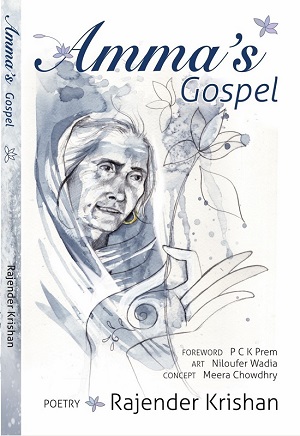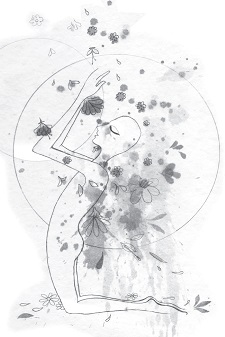Feb 03, 2026
Feb 03, 2026
Amma's Gospel by Rajender Krishan
Amazon ebook ASIN: B08LSYFLN4 Amazon USA | Amazon India
Paperback ISBN-13 : 978-1-947403116 Amazon USA | Amazon India
 Rajender Krishan, the poet of ease and grace, makes the motto of his poetry book Amma’s Gospel, published in 2020 by Setu Publications, USA, clear in the Preface: ‘…whenever I am confronted with dilemma, I end up invoking Amma (my paternal grandma—Shrimati Ratan Devi: 1900—1982). I invariably get answers to the questions and also her guidance to deal with the difficult situation in life.’ So to the poet Amma proves to be basically a fountain of resources in his trying time, and he seeks her blessings in words and in silence and he is invariably rewarded with her inner light and he is showed the true path of life and living—to be ‘clean, committed, content,/ honest, kind, loyal, non-violent,/ persevering, poised and tolerant,’ (“Healing”, p. 72). The said qualities have an overwhelming presence in Amma’s vocabulary. For instance, ‘…the charity of kindness, / tolerance and love,/ begins at home (“Compassion”, p. 81.)
Rajender Krishan, the poet of ease and grace, makes the motto of his poetry book Amma’s Gospel, published in 2020 by Setu Publications, USA, clear in the Preface: ‘…whenever I am confronted with dilemma, I end up invoking Amma (my paternal grandma—Shrimati Ratan Devi: 1900—1982). I invariably get answers to the questions and also her guidance to deal with the difficult situation in life.’ So to the poet Amma proves to be basically a fountain of resources in his trying time, and he seeks her blessings in words and in silence and he is invariably rewarded with her inner light and he is showed the true path of life and living—to be ‘clean, committed, content,/ honest, kind, loyal, non-violent,/ persevering, poised and tolerant,’ (“Healing”, p. 72). The said qualities have an overwhelming presence in Amma’s vocabulary. For instance, ‘…the charity of kindness, / tolerance and love,/ begins at home (“Compassion”, p. 81.)
Amma’s Gospel has 45 poems of varied length and taste. The poem “Amma ji” aptly introduces her with the readers. She was a brave woman, a woman of courage and resilience:
Amma, had faced the colonial
subjugation and suppression;
finally gained independence
only to become a refugee,
a migrant in her own country
in the post-portioned IndiaYet all these drastic transitions,
could not shake her verve for life
Amma led her entire clan
With patience and resilience (p. 37)
Amma’s life was exceptionally strenuous. The wounds of partition made her a woman of fortitude and forbearance. She had seen and known much of the world, and her experiences are gems for the posterity. Amma’s advice for parenting:
Impose not on your children
your footprints, rules and criterion
simply lend them
A helping hand (“Destination” p. 83)
reminds me of Gibran’s famous lines ‘Your children are not your children/ …..You may give them your love but not your thoughts.( “On Children”).
Whenever the poet is confused in ‘cruising through the vagaries and variables in the play of life’ he asks Amma’s guidance and he is immediately bestowed with her words of eternal wisdom:
Love yourself
by being true to yourself
Be not haste to react
First anticipate then contemplate
and
then respond
Follow the right path
Be happy
Be successful. (“Amma’s Gospel”, p. 47)
This particular message acts as a refrain and runs throughout the book. Amma’s light has been recurrently shed on the poet and it ennobles and strengthens the poet’s integrity in times of crises. Throughout the book the poet asks, and Amma delivers. Initially the poet is hesitative, ‘Have I Fathomed?’, ‘When will I learn? He berates his soul to find truth and beauty in living life. He is much is in the world. He is warned of Amma’s words on hypocrisy and deceit being manifested in individuality:
Treacherous is this play
that hoodwinks you to become
a puppet of emotions
a victim of desires
and not the master of your mindThe sham and deviousness
of playing blame games
makes you a gadget of ego
that traps and ensnares
leading to a fraudulent integrity
of tumbling self esteem
unable to see its very own reflection (“Amma’s Gospel”, p. 46)
 The book is a treasure trove to the spiritualists. But it can also be equally enjoyed by an agnostic. Let’s have a look at these lines:
The book is a treasure trove to the spiritualists. But it can also be equally enjoyed by an agnostic. Let’s have a look at these lines:
What about riches? (the poet asks Amma), and she kindles our mundane thoughts with her ever shinning wisdom:
There are no better riches than
acceptance of Life as it is
Doing what you can do best
Resilience to withstand all hurdles
Good health to meet
the purpose of everyday
Wisdom to differentiate
between right and wrong
Being humble and grateful
in His Compassionate Grace. (“Why Pray ”, p. 49-50)
Let’s argue the point I want to universally validate in upholding the sacred path of human rights and human dignity and freedom. Irrespective of one’s belief in one’s religion, creed, language and culture the points Amma highlights has a universal relevance and validity. A ‘wrong’ doer cannot be a religious man. Likewise, a ‘right’ doer, whether he visits houses of gods or not, whether he prays or not, is a religious man. To achieve ‘wisdom to differentiate/ between right and wrong’ is very important both in our public and private life. Life should be led by the light of the right. And we need to be ‘humble’ and ‘grateful’, if not to gods, but to our fellow men in our everyday dealings. Sadly that we are missing in our age of machine and automation. Our neigbours remain unknown for life, we do harm to our helpers. Amma’s words have much to play to make us better human beings.
Amma is deeply concerned with the present, the living reality. There is a focus on ‘now’, the presentness of our being on earth. In “Quest”:Amma clarifies,
Remember,
Life is in the Now
Of cause and effect
Not in the past nor in the future. (p.58)
There is similar emphasis on our present existence in such poems as “Today”, “The Present” and “Now”. ‘Today/ is inimitably / a wonderful day’ to ‘appreciate/ what is now before us’ (“Today” p.93). And here I am reminded of Ingersoll, ‘Happiness is the only good. The time to be happy is now. The place is to be happy is here. The way to be happy is to make others so.’ This presentness of being happy by withdrawal from ‘the messy rivalries/ and greedy ambitions “Renunciation, p. 149) and be able to ‘withstand all hurdles’ ‘deceits’ ‘crookedness’ with resilience, champions the cause of human aspiration and freedom and dignity. If we bury, for our argument’s sake, the questions of birth, rebirth, moksha, heaven or hell the book outshines in its texture of common sense and everyday wisdom.
Moreover, I want to go with Allama Iqbal:
Khuda tujhey kisee say aashna kar dey
Keh terey beher kee maujon mein iztiraab naheen(May God bring a storm in your life,
There is no agitation in the waves of your life’s ocean.)
We need not peace of mind, but highly agitated mind that creates art and literature which is against all forms of injustices, wrongs, hypocrisies, exploitations, corruptions, which we unfortunately face at each foot step in our country and elsewhere. Amma has given strength to face reality with resilience and our sense of better judgment. After reading this book if one hides from the realities of our life—poverty, lack of infrastructure, corruption, hate speeches, violence, intolerance, suffering masses in pandemic, she may be an enlightened reader, but she surely fails to grasp Amma’s ever day wisdom. Our country bleeds in Corona pandemic. Let’s do what we can do. Let’s not harangue as the media people and both pro and anti government intellectual are doing.
Thus Amma’s Gospel is not for the mystics and the spiritualists only. It is for you and I and everybody. The message is too clear. We need to imbibe refined, superior qualities in our character and then we will be resilient to withstand the obstacles and complexities and confusions of post-truth age. At least we will be able to confess our sins of being silent, of not doing enough for millions working mass of our land.
The poet has used internal rhymes; end rhymes as well as rhetorical devices and Krishna’s words are lucid and heart-touching. They are very effective to drive his thoughts home.
The cover of the book is impressive and it has an aesthetic appeal too.
More on Amma's Gospel
22-May-2021
More by : Dr. Abu Siddik